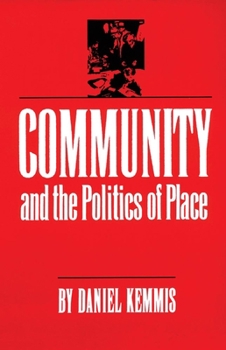Community and the Politics of Place
Select Format
Select Condition 
Book Overview
Thomas Jefferson envisioned a nation of citizens deeply involved in public life. Today Americans are lamenting the erosion of his ideal. What happened in the intervening centuries? Daniel Kemmis argues that our loss of capacity for public life (which impedes our ability to resolve crucial issues) parallels our loss of a sense of place. A renewed sense of inhabitation, he maintains -of community rooted in place and of people dwelling in that place in a practiced way-can shape politics into a more cooperative and more humanly satisfying enterprise, producing better people, better communities, and better places. The author emphasizes the importance of place by analyzing problems and possibilities of public life in a particular place- those northern states whose settlement marked the end of the old frontier. National efforts to "keep citizens apart" by encouraging them to develop open country and rely upon impersonal, procedural methods for public problems have bred stalemate, frustration, and alienation. As alternatives he suggests how western patterns of inhabitation might engender a more cooperative, face-to-face practice of public life. Community and the Politics of Place also examines our ambivalence about the relationship between cities and rural areas and about the role of corporations in public life. The book offers new insight into the relationship between politics and economics and addresses the question of whether the nation-state is an appropriate entity for the practice of either discipline. The author draws upon the growing literature of civic republicanism for both a language and a vantage point from which to address problems in American public life, but he criticizes that literature for its failure to consider place. Though its focus on a single region lends concreteness to its discussions, Community and the Politics of Place promotes a better understanding of the quality of public life today in all regions of the United States. Daniel Kemmis, a senior fellow at the Northern Light Research and Education Institute (Missoula, Montana), is a former minority leader and speaker of the Montana House of Representatives and is presently the mayor of Missoula
Format:Paperback
Language:English
ISBN:0806124776
ISBN13:9780806124773
Release Date:September 1992
Publisher:University of Oklahoma Press
Length:160 Pages
Weight:0.53 lbs.
Dimensions:0.5" x 5.4" x 8.5"
Customer Reviews
2 ratings
Required Reading
Published by Thriftbooks.com User , 20 years ago
Required reading for anyone who wonders how America came to be a divided, polarized nation. Kemmis traces the traditions of American political discourse and relates them to current civic debates. Another book that deals with the need for a sense of community is M. Scott Peck's "The Different Drum: Community-Making and Peace," 1987.
Democratization of community politics has arrived.
Published by Thriftbooks.com User , 26 years ago
The book traces the citizens' involvement in government from the Founding Fathers to today's community meeting at the county courthouse. I enjoyed the coverage of Jefferson and Hamilton's debates and the exploration of the citizens' role in government. Through a historical understanding of the structure of our government (which is shown to discourage consensus and promote litigious solutions), the book espouses the benefits of grassroot community-based solutions to societal problems.






